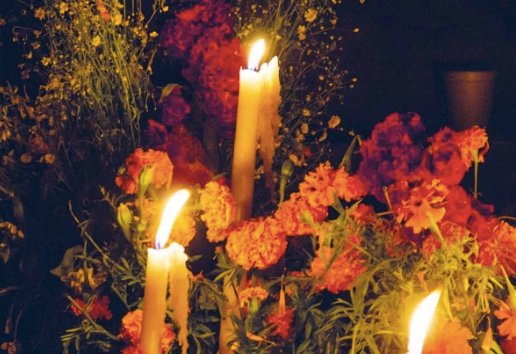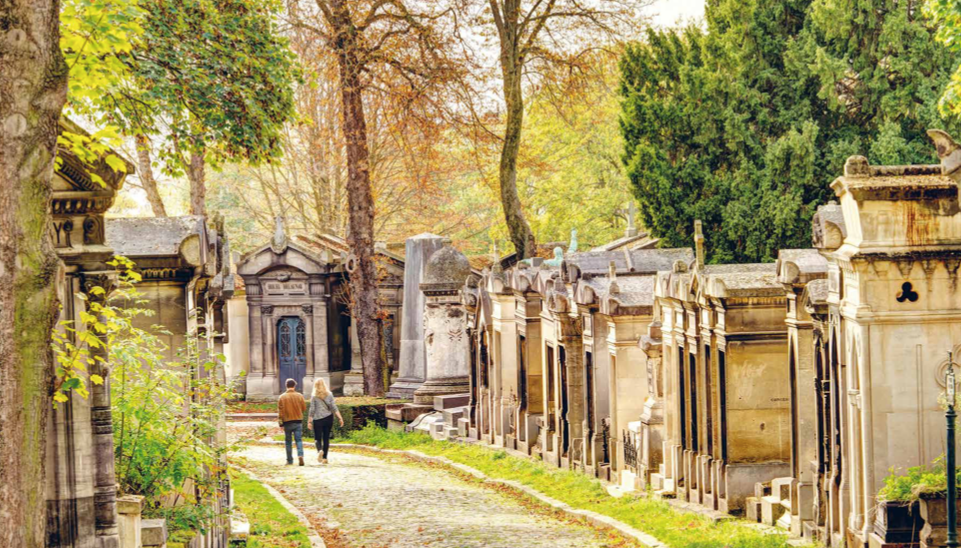In this extract from Lonely Planet’s Guide to Death, Grief and Rebirth, author Anita Isalsk shares her thoughts on death, grief and rebirth, and shares her favourite podcast on the subject.
Death is one of the most pervasive themes in art, music and literature, but grief still leaves us lost for words. When someone dies, life’s big questions besiege us. We seek solace in mementoes, photographs and rituals of remembrance. Death is universal, and yet every loss is intimate and unique.
In my own family, we have the empty chair. Leaving a spare seat at the table is a common Polish custom, especially on Christmas Eve. My family, descended from World War II transplants to the UK, inherited this tradition – along with pickled herring and Catholic guilt. Some claim the custom grew from pagan beliefs that the dead dine after the living. Others say it’s a gesture of that famous Polish hospitality, and a throwback to the Biblical story of Mary and Joseph who couldn’t find room at the inn. In the 19th century, empty chairs held space for exiled family members, whose loved ones prayed for their return from forced deportation to Siberia.

Over the years, the empty chair at my family’s table also took on a new meaning.
First came the death of my grandmother. A steely and sharpwitted survivor of war, her fierce loyalty and theatrical humour had created a blueprint our entire family would follow. When she died she was no longer the anchor of every social event, but the occupant of our empty chair.
Then came the shocking and sudden death of my uncle; another pillar of our family had fallen. We couldn’t build back to how we once were, but we didn’t want to forget, either. We made toasts in his words, retold his dry jokes, and looked across at the empty chair – which now felt doubly bare, a monument to repeated loss.
When someone dies, people tell each other: “there are no words”. Many of us are on a life-long quest to find them – to grapple with understanding the finality of death and how it impacts how we live.
Death has long been a theme of my own travels: I’ve pored over inscriptions in Paris’ Père-Lachaise Cemetery, contemplated marigold altars on the Day of the Dead, and gazed into empty eye-sockets at the bone chapel at Kutná Hora. Consciously or subconsciously, I’ve been trying to wrap myself in wisdom about life and death around the world – to live my own life in a fearless way, and find a better way to navigate loss.
Over the past decade, we’ve seen this quest reverberate from movies and TV shows. In Fleabag, Phoebe Waller-Bridge’s contrarian lead character wrestles with guilt after the sudden death of her best friend. In After Life, Ricky Gervais plays a small-town newspaper editor living with almost unbearable grief. In both series, death and grief aren’t just plot points; they’re ever-present companions to the main characters, the source of dark humour and personal growth.
Podcasts on Death, Grief and Rebirth
Now, a new movement is emerging to guide people towards expressive, community-oriented ways to grieve. “To heal grief, you need to grieve – and we don’t know how to grieve,” says Imogen Carn, co-founder of the Good Mourning podcast (goodmourning.com.au). “We really need to learn how to express our pain in a safe way, in a way that isn’t judged.”
Imogen Carn and Sally Douglas launched Good Mourning after experiencing first-hand the complexity of grief and the lack of relatable grief resources. “We thought, why don’t we start grieving publicly, and letting other people know that all of these thoughts and feelings are actually normal?” explains Carn. In cultures where dying and grief occur privately, in hospices, hospitals and the home, the lack of community support can make grief debilitating. “There isn’t really strong aftercare support,” says Sally Douglas. “What we’re trying to do is have conversations in public about grief and death, so that we can start bringing support, awareness and education into community spaces.”
Another podcast breaking the silence is All There Is, launched in 2022 by Emmy award-winning broadcast journalist Anderson Cooper. Speaking on the podcast about the isolation he felt after the deaths of his father and brother, Cooper recalled: “I felt like I couldn’t speak the same language as other people.” Cooper was able to move forward in his grief by bearing witness to the experiences of others: “I went to places where the language of loss was spoken, and the pain that I was feeling inside was matched by the pain all around me. And that’s how I learned how to survive.”

That search for the languages of loss is also why the book ‘Death, Grief and Rebirth’ came into being. How do people around the world navigate death and live with grief? And what can these different beliefs and rituals teach us about how to live our lives?
Though the traditions in the book are radically different, certain themes emerge: like creating the space to deeply mourn our loved ones while also celebrating their lives. Even the ways we commemorate the dead and remember their lives are astonishingly varied
Grief is colossal and all-encompassing, but it also challenges us to be humble. We can find relief by placing our personal sorrows in the context of humankind’s grand, unfolding drama. People alleviate their pain by returning loved ones to nature, perhaps in a green cemetery or even through a ‘sky burial’. Through a Buddhist lens, death is a transition period, not the final curtain.






